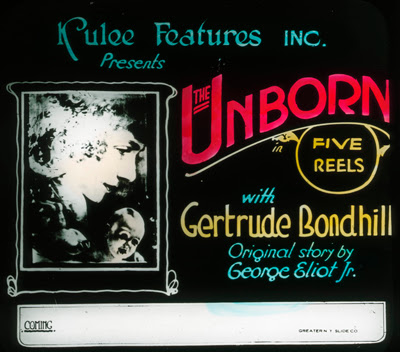Censored in Chicago – For Women Only
October 12, 2010

This dramatic slide advertises The Unborn, a controversial 1916 film featuring an abortion doctor as a central character. The director (who obviously felt the need for anonymity) is listed in the credits as "Otis B. Fair," an obvious pseudonym.
In his book, American Film Cycles: The Silent Era, Larry Langman describes the plot:
"A young man from the city takes advantage of a young woman from the country [...] He abandons her and marries a member of his own group while she, now carrying his child, leaves home to work in a New York Factory. The man, now happily married, does not know he has a son. The girl he wronged dies, leaving their son to fend for himself as a newsboy. The man, yearning for a child, meets the boy and adopts him, not knowing the alleged orphan is his own son. The father accidentally discovers the truth about the boy's identity. "You are my son," he says to the boy. "So you are the man who wrecked my mother's life," the youth replies. He leaves home and returns to selling newspapers. Awkwardly interspersed into the film are scenes of a doctor who performs illegal abortions. When the police finally track him down, [and while attempting escape] the doctor shoots wildly. The boy, noticing that his father happens to be in the path of the bullets, runs forward crying, "Daddy!" The youth, fatally wounded, forgives his father and dies."
Just to be clear: The woman dies, the boy is shot and killed, the doctor (presumably) goes to jail, and the "man" is forgiven and goes on with his life.
According to modern reviewer Janiss Garza, the film may have been an attempt to repeat the success of Lois Weber's anti-abortion Where Are My Children? which had been released earlier that same year.
It is unclear how successful the film was at the box office, though Variety reported that it did booming business at the Band Box Theater in Chicago which had instituted a "women only" policy to placate local censors who deemed the film too sensational for a mixed male-female audience. According to Variety, the venue "hit a [box office] gusher when it decided to bar the men, for the house has been packed every performance since it opened."
